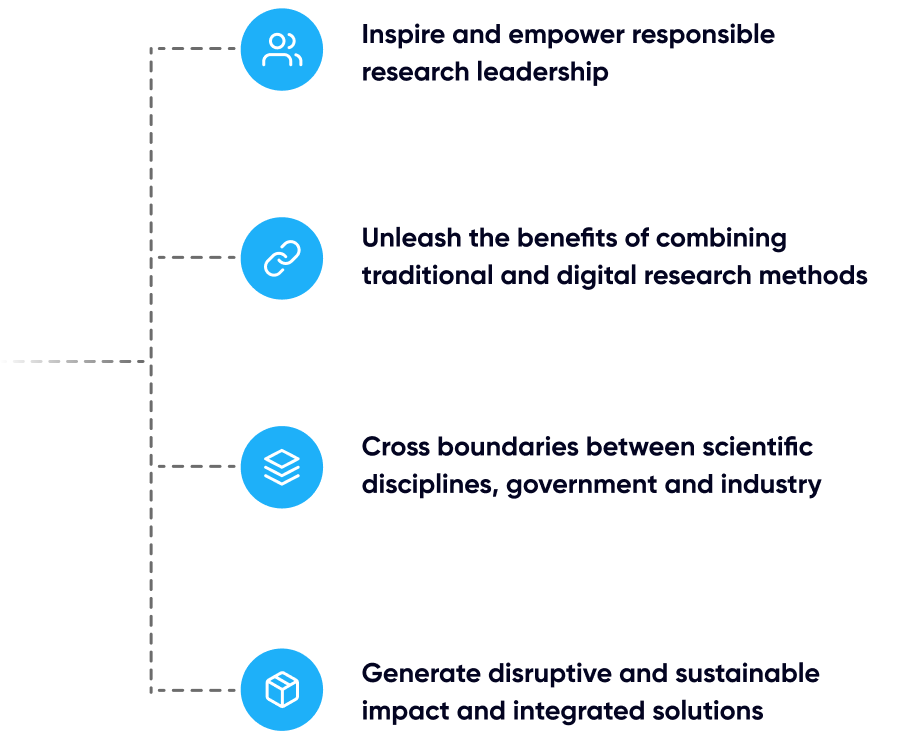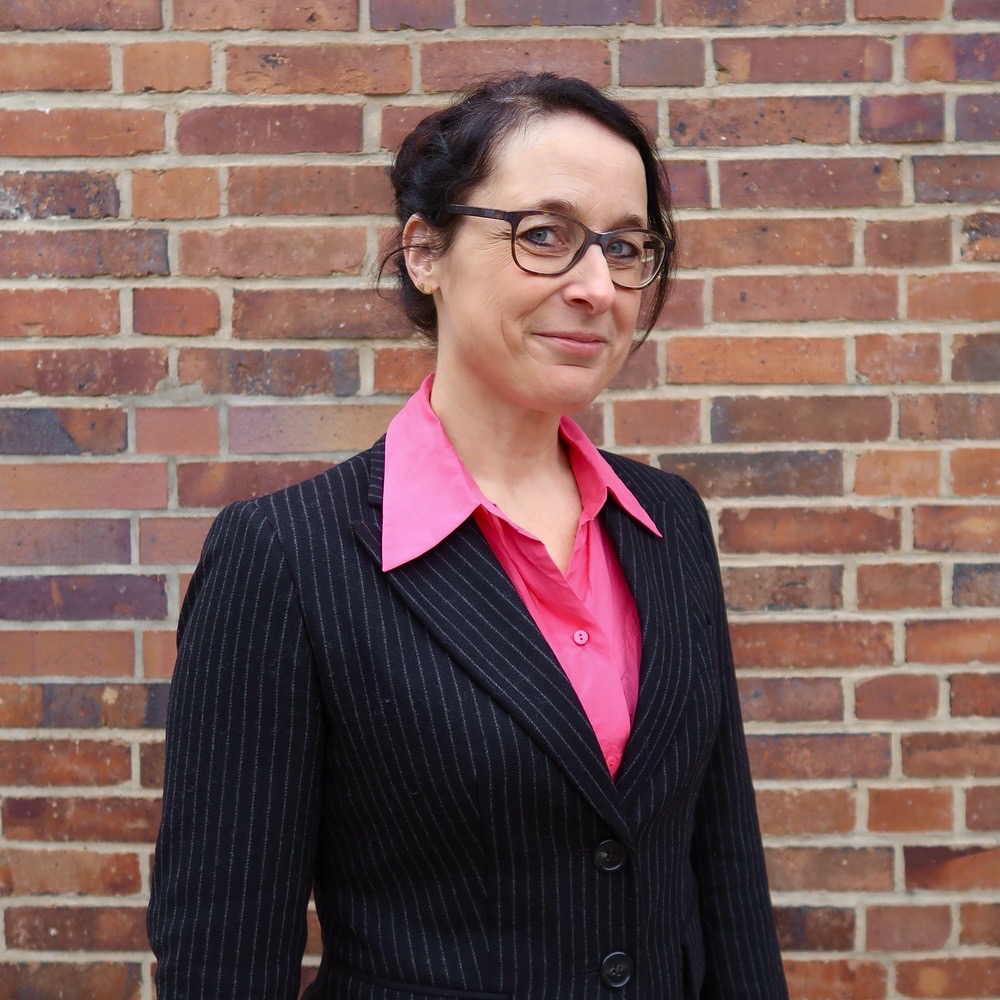Our Research strives to develop and disseminate knowledge regarding the digital, green and fair transition of our economy and society.
We are in the midst of radical social transformations fuelled by the phasing out of fossil industries and climate change which create new risks and liabilities. This results in an increased shortage of skilled workers and a net loss in innovation ability. Many young people wonder how society will survive to and strive in the next centuries. Without a shadow of doubt, we and our future generations will have to rely on the knowledge and wisdom generated by universities who dare to go beyond conventional ways and think in an integrated way, innovating and prototyping the solutions of the future. This is our mission!

XU Research Committee
At XU Exponential University, we pursue science for theory and practice by developing sustainable solutions for societal challenges, especially as they are brought about by digitalization, in the present and the future. In this sense, the research committee focuses, in addition to the transfer of results, primarily on the joint development of issues in the field of digital sustainable change of economy and society. To this end, our scientific staff has established the following research clusters:

Prof. Dr. Maren Borkert
Chair, Professor Digital Entrepreneurship and Innovation Management

Prof. Dr. Mohammed AbuJarour
Professor Coding and Software Engineering

Prof. Dr. Raad Bin Tareaf
Professor Data Science

Angela Kern
Head of Academic Advancement

Viktoria Hafner
Student Representative
Our Research Instruments
Guideline for Promoting Research
Our major concern is to combine theory with practice in teaching and studying and to support companies in their developments through applied research. To this aim we promote the development of cutting edge research activities, through an incentive system, various research symposia, the establishment of a research fund, the appointment of a research officer and the promotion of junior scientists.
Rules for Good Scientific Pratice
XU Exponential University is committed to upholding and promoting principles of good scientific practice and to translate them into the digital age. Legal provisions and cultural behaviour are ingrained into the XU rules of good scientific practice which are made known and compulsory to university staff and students.
Research Fund
For the financial support of research and development projects, the XU Exponential University provides annual funding in the amount of around €50.000. Activities such as start-up or interim financing, participation in scientific meetings and conferences as well as preliminary research for the application of third-party funded projects, can be supported from the research fund.
Best Paper Award for Graduates
Every year the BA and MA supervisors can submit nominations for the Best Thesis Award. The XU Best Paper Award Committee reviews and discusses the submissions and grants the best paper awards to every study program.
Our Research Clusters
At XU Exponential University, we pursue science for theory and practice by developing sustainable solutions for societal challenges, especially as they are brought about by digitalization, in the present and the future. In this sense, the research committee focuses, in addition to the transfer of results, primarily on the joint development of issues in the field of digital sustainable change of economy and society. To this end, our scientific staff has established the following research clusters:
Our Research Projects

Fairwork Project
The Fairwork project is run out of the Oxford Internet Institute, University of Oxford, and the Berlin Social Science Center. Through our global network of researchers, we evaluate the working conditions of digital labour platforms and score them against five principles of fair work.
Latest Publications
Towards decent work in the digital age: introducing the fairwork project in Germany
Bertolini, A., Borkert, M., Ferrari, F., & Graham, M.
Zeitschrift für Arbeitswissenschaft, 75(2), 187-192, Springer Publishing, doi: 10.1007/s41449-021-00247.
A Digital Tale of Two Cities—Observing the Dynamics of the Artificial Intelligence Ecosystems in Berlin and Sydney
Lammers, T., Cetindamar, D., & Borkert, M.
Sustainability, 13(19), 10564, https://doi.org/10.3390/su131910564
Germany’s Platform Economy Paradox (in publishing)
Borkert, M.
Digital Geography and Society, Vol. 3 (in progress), Elsevier.
Investor demand in syndicated bond issuances: stylised facts
Hillebrand, M., Mravlak, M., & Schwendner, P.
Available at SSRN: https://ssrn.com/abstract=4002279 or http://dx.doi.org/10.2139/ssrn.4002279.
The Impact of Digitizing Social Networks on Refugee Decision Making–The Journey to Germany
AbuJarour, S., Jaghjougha, L., & AbuJarour, M.
In International Conference on Wirtschaftsinformatik (pp. 331-345). Springer, Cham, https://doi.org/10.1007/978-3-030-86790-4_23 .
Connecting Human Potentials and Opportunities Through Technology: A Digital Integration Use Case
Safa’a AbuJarour, & AbuJarour, M.
In PACIS (p. 30), https://aisel.aisnet.org/pacis2020/30
How Did Design Thinking Develop in the Arab World? Findings from Twitter Analysis
Traifeh, H., Bin Tareaf, R., Abou Refaie, R., Meinel, C., & Von Thienen, J.
Journal of Design Thinking, 2(2), doi: 10.22059/jdt.2022.312803.1063. (PDF) How Did Design Thinking Develop in the Arab World? Findings from Twitter Analysis (researchgate.net)
MBTI BERT: A Transformer-Based Machine Learning Approach Using MBTI Model for Textual Inputs
Bin Tareaf, R.
In 2022 IEEE 24th International Conference on High Performance Computing and Communications; IEEE 20th International Conference on Smart City; IEEE 8th International Conference on Data Science and Systems (HPCC/SmartCity/DSS), IEEE.
Dynamic Scheduling Techniques in Cloud Manufacturing-An Exploration of Deep Reinforcement Learning as a Critical Opportunity for Future Research
Chambers, D., Lammers, T., & Yu, K.
Production Management and Process Control, 36, 106, https://doi.org/10.54941/ahfe1001625
Can product modularization approaches help address challenges in technical project portfolio management?–Laying the foundations for a methodology transfer
Lammers, T., Guertler, M., & Skirde, H.
International Journal of Information Systems and Project Management, 10(2), 26-42, DOI:10.12821/ijispm100202.
The Usability of E-learning and Blended Learning Platforms (submitted)
Budakov, P.
GiLE Journal of Skills Development (GJSD). Acta Scientific | International Open Library | Open Access Journals Publishing Group

